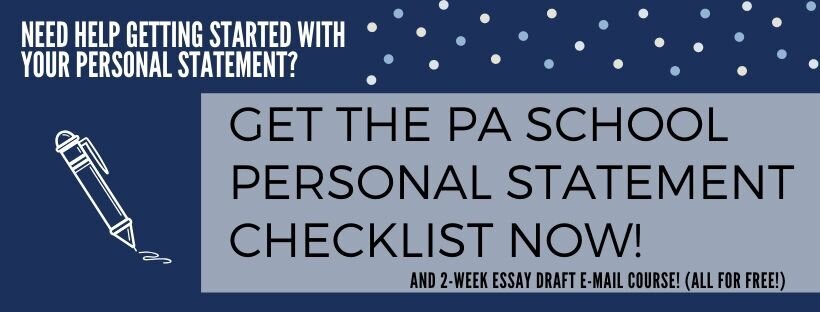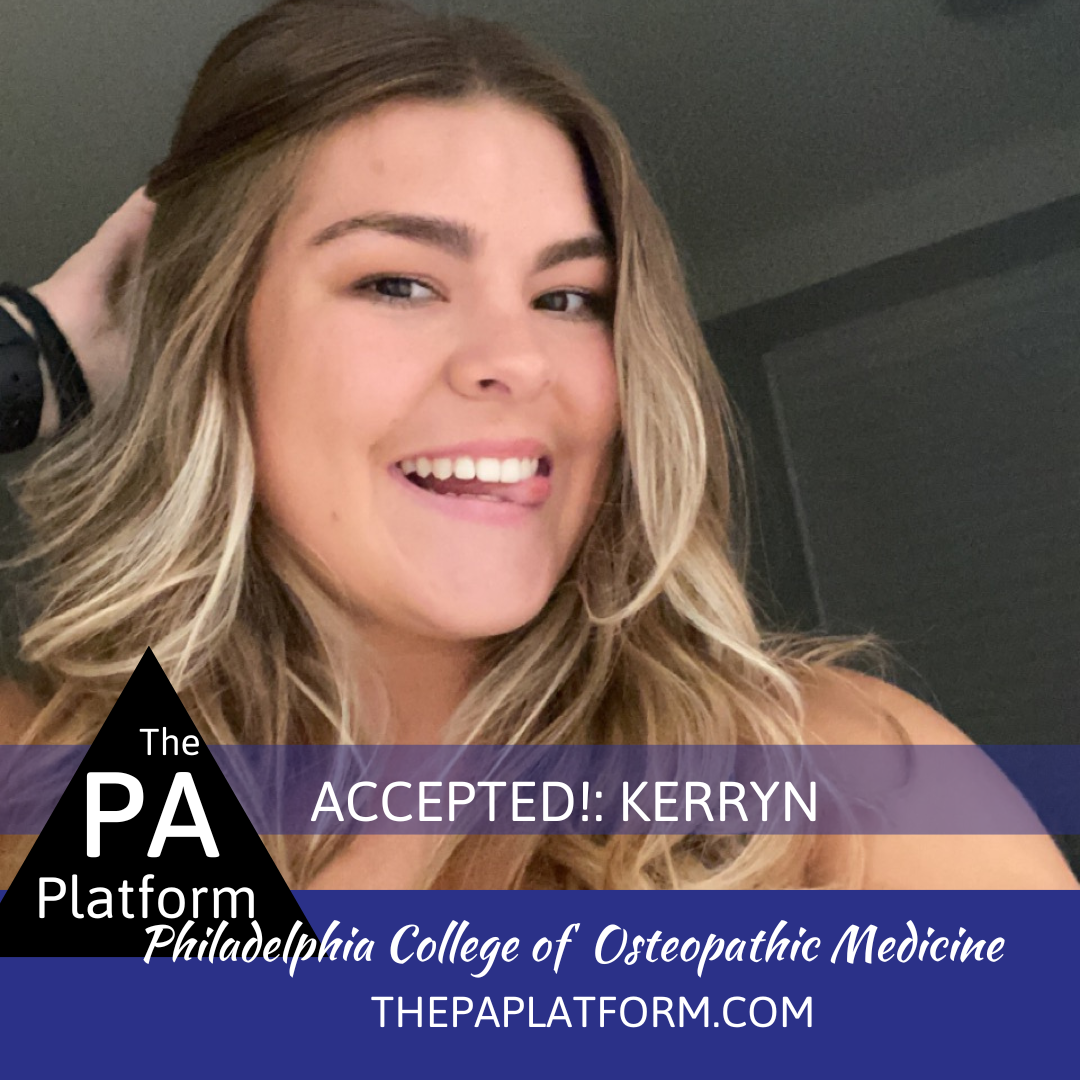If you are about to begin your undergraduate degree, or if you are currently amidst your college career, and you plan on going to PA school, start here! There are some key elements that you should have prepared before you begin applying to physician assistant programs.
The biggest tip I can give is to start. preparing. early. The importance of organizing early and planning ahead is insurmountable and makes the process of applying way less taxing.
So, where do you start?
Let me break down the key elements, in order of importance, that you need to focus on throughout your undergraduate career to make everything a breeze when you start applying to PA school!
1.GPA: focusing on your GPA is vital. I suggest starting to prioritize your grades early (especially in your science courses), rather than leaving it all to your senior year when you have to bump up your GPA. This will pay off in the end when you have a decent GPA, which is the very first thing that PA programs look at. If you don’t meet their minimum GPA requirement, your application is immediately put to the side (harsh, but true).
2. Prerequisites: I would meet with your advisor to schedule your classes for each semester. This will help you have full confidence that you will graduate with the necessary class credits to be able to apply to PA school. Do this your freshman or sophomore year, preferably. If you decide that you want to take the route of a career as a physician assistant later than this timeframe, that’s totally fine and doable! But, definitely meet with your advisor to see how many classes you may be missing. Here’s what I did personally;
I bought the Applicant’s Manual of Physician Assistant Programs and flagged the pages of whichever programs appealed to me. The book has a comprehensive breakdown of every program in the country and provides important details like the program start date, tuition, GRE requirements, and minimum required clinical hours. Rather than searching every program’s website for all of this, this manual has it all summarized simply and clearly.
I then made a list of the classes that these programs required. I made sure I had every required class so that no matter what school I applied to, I wasn’t going to be missing any classes. Most schools have common pre-requisites but some require a class or two that may sneak up on you so keep an eye out for those! Here are the most common pre-reqs you will see:
Human Anatomy and Physiology I & II (both with labs)
Chemistry I & II (both with labs)
Organic Chemistry I w/ lab
Statistics: 3 credits
Microbiology w/ lab
Psychology: 3 credits
Medical terminology: 3 credits
3. Patient care experience (PCE): this component of your application is one of the most important. Many programs require you to have a minimum of anywhere from 500-2,000 hours (1/2 – 2 years working full-time) of hands-on medical experience to apply to their program. Any extra experience on top of that makes you a competitive applicant. Although this seems daunting, it is easier to tackle if you begin early. There are many different positions that will get you the experience you need and that qualify as “hands-on” patient care. Here’s a few to start you off:
Medical Assistant
Certified Nurse Aide
Physical Therapy Aide
ED Tech
EMT
I know the feat of accumulating hundreds and even thousands of hours of patient care experience while also being a full time student seems nearly impossible, but I promise it’s possible if you break it up into smaller chunks.
Tip: Working when you’re on college breaks is a great way to do this and is what I did personally!
4. Letters of recommendation (LORs): LORs are very important to start thinking about early on in your undergrad career. When you start taking your core science courses and prereqs, work on creating a good relationship with your professor and doing well in these classes. If you go to a larger university like I did, make sure to go to your professor’s office hours so they know who you are. I went to every one of my professor’s office hours that I could for my Organic Chemistry I & II classes before I asked her to write my letter.
Important note– ask your chosen professor EARLY if they will write your letter of recommendation for you. Give them at least a couple months heads up before you ask them. Have your resume ready for them to refer to and have a list of your programs you will be applying to as well as their application due dates.
*Pro tip*: college professors are always busy so give them a due date that is actually a few weeks before the actual due date just in case they are late in completing it! Also, send them a quick email a week before it’s due to remind them that the due date is approaching.
5. GRE: Many schools require their applicants to have taken the GRE and some require a minimum score as well. Definitely take the GRE just to be safe so you don’t limit your options. I recommend taking the GRE anywhere from 3-6 months prior to applying. As far as actually studying for the test, I bought the Kaplan GRE Prep Plus Book which was plenty of study material to help me do well on the test. The book comes with access to online resources and practice exams as well. My biggest advice is to do PRACTICE TESTS. Yes, practice tests are the worst, but it was the most important step I took to do well on test day.
6. Personal statement: Your personal statement is something I would just simply start to think about around a year before you apply to programs. I personally began thinking about what I wanted to write about for my personal statement very early on. I started simply by making a document on my phone called “brain dump”. This consisted of random ideas that had popped into my head for topics for my personal statement. It also had some experiences during my medical experiences that I thought could be useful to incorporate into my essay in the future.
In this way, I wouldn’t forget my brilliant idea and I knew I could come back to this document at a later date when I was ready to start. This helped SO. MUCH. Also, definitely use your university’s writing center if they have one. I brought my personal statement to my school’s writing center probably 5 different times. I also had several different versions of it before I was happy with it. Writing your personal statement is not something you want to rush or to be stressing over right before you have to apply. Take your time with it!
*A few other tips I found super helpful that I did before I applied!!*
MAKE AN EXCEL SHEET!
I created an excel sheet years before applying to keep track of all of my medical experience hours. I began tracking everything as a freshman in college. What I personally kept track of was as follows:
Shadowing hours
PCE hours
Volunteering
Research (if applicable)
For each category, write in separate columns:
Name and position of your supervisor/who you shadowed
Supervisor contact information
Location and specialty in which you shadowed/worked
Your job title and responsibilities
How many hours you completed
The actual dates of the experience
Having all of the information about your many hours of healthcare experiences already written down is so helpful so all you have to do is input it into the CASPA application when the time comes! Having the amount of hours you completed is especially helpful so you don’t have to do the math when it comes time to apply.
I also recommend including a -notes- section where you can debrief about each of your experiences. Here, you can include what you saw, something you learned, a story that moved you, or really anything that stood out to you. This will help in 2 HUGE WAYS:
Your personal statement: The notes section for each medical experience comes in handy when you have to reflect on your many hours of shadowing, working, or volunteering. I personally would not have remembered anything about what I did, what I learned, or any specific stories if it wasn’t for this log. I was able to read my notes and see if anything stood out that could be used to include in my personal statement. Moments like this can be used as a personal growth moment or an emotional story that would add depth to my essay.
The interview: Having this log can he beneficial when it comes time to interview if you are granted one (yay!). You can scan over your experiences and how it benefitted you and what you learned from each one so you are prepared to answer any in depth personal development question in your interview.
Another great tip!!
Create a CASPA account EARLY!
I made a CASPA account wayyyy before I actually applied. In this way, I was able to get familiar with the website itself, see what information I needed to be able to fill out the app successfully, and to even start inputting my medical experiences and classes. Putting these experiences in little by little makes it easier when it comes time to actually submit your app and you’ll be way less overwhelmed.
That’s all y’all
Overall, all of these requirements will be necessary for you to be a great applicant, which in turn a great student, and a great PA in the future. You wouldn’t be able to get all these requirements done if you weren’t 100% committed to and passionate about the PA profession. That’s all the admission committee needs to see. Keep your end goal in mind and stay driven. Persistence, grit, patience, passion, and dedication is KEY!
I hope this helps and gives you ideas in how to prepare early for your application. I personally followed all of these suggestions and I was stress-free when it came time to apply. Right when the application cycle opens, you will have everything already inserted and ready to go and all you have to do is press submit! This then ensures that you are one of the earlier applicants, which for programs with rolling admissions, is extremely beneficial and increases your chances of being accepted! Woohoo!
Thanks for reading,



















